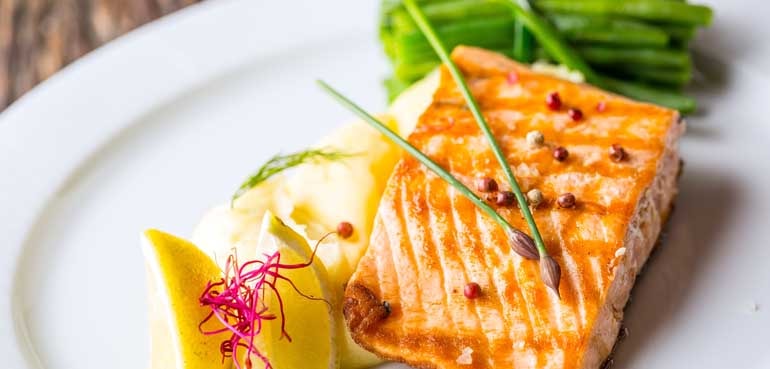By Stephanie Burt
If you’ve ever grilled fish, chances are you’ve had a mishap or two, like a flaky fish stuck to the grates or a filet flipped up at the edges and overcooked. Maybe you’ve gone to turn or pick up a piece of seafood and accidentally sacrificed some of it to the grill gods and charcoal below.
It’s true—grilling fish can be tricky. But if you’re willing to plan a little, the rewards of a grilled slab of swordfish or tuna tattooed with perfect grill marks can be yours.
To help you out, we consulted the experts. “I have conducted countless experiments on how to grill fish successfully,” says Wayne Samiere, founder, president and CEO of Honolulu Fish Company (HFC), located in a 5,000-square-foot facility just minutes from the docks in (you guessed it) Honolulu, HI. HFC sells more than 30 varieties of fresh fish to more than 3,000 customers and is regarded for upholding the highest standards of quality, food safety and award-winning technology in fish distribution.
Samiere has been fascinated by fish since he was a child and definitely knows a thing or two about cooking it. Here are his four guidelines for successfully grilling fish every time.
Choose your fish wisely.
Look for open ocean fish like swordfish, marlin or tuna. Open ocean fish are more firm because they are bigger and swim longer distances. “And because they are more firm, they’re more forgiving [on the grill],” Samiere says. Choose medallions or steaks that are at least 1.5 inches thick. “This is different from the size I would choose, for instance, for pan frying, but a bigger fish ‘steak’ is more meat-like and will be easier to handle on the grill,” Samiere explains.
Although the semi-firm fishes like mahi, halibut and wahoo are delicious, those varieties can be more of a challenge to grill. You’ll also want to avoid the softer fish such as flounder, snapper and sole unless you are grilling inside a foil packet or fish grill basket.
Marinate it, preferably overnight.
Although a lot of cooks suggest marinating fish for 30 minutes to an hour, Samiere prefers to marinate his overnight because it’s simpler to execute and “it imparts kind of a ceviche effect, since the marinade slightly cooks the outside. I like getting that thin outer shell and then getting some good grill marks on it.”
As for his marinade of choice? Good old-fashioned bottled Italian dressing, he says. “It has everything: herbs, spices, oil, and vinegar, and it always performs. You can add fresh herbs like rosemary or thyme from the garden if you have them, but you don’t have to.” Purchase your favorite brand, place the fish in a glass or non-reactive dish, pour in the dressing, cover with plastic wrap and refrigerate overnight.
Gas or charcoal? Your choice.
“Man, you just can’t beat charcoal for flavor,” he says. “My heart and passion are with charcoal, and sometimes I add wood chips or smoking chips. But if I have a lot of guests coming over, I will use gas because it is very convenient and heats quickly.” Gas also allows the fish expert to cook over a consistent flame, which is important when you are cooking more food in batches.
Don’t overcook it.
Overcooking is the number one reason that fish can become dry and tough on the grill. “Only cook your medallion about a quarter of the way through,” Samiere asserts. “It important that the center be nearly rare. Then move the fish steak off direct heat to a part of the grill where it can stay warm. The fish will continue to cook a bit since it’s holding a lot of heat and will be very moist.”
And finally, serve it as soon as it’s done. You want all those natural juices and fish oils to be warm as that makes for a tender bite! Have all your sides ready (and guests too) so when the fish is ready, so is the meal.

